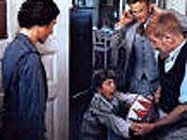|
|
|
|
The
Tin Drum
|
 |
|
Of all the German film directors who came to prominence in the 1970s, Volker Schlöndorff has always been the most conservative and least interesting. His chosen specialty is the solidly crafted, handsomely styled, extremely faithful adaptation of modern literary classics, from Proust to Margaret Atwood. Watching Schlöndorff's version of Günther Grass's The Tin Drum nineteen years after its initial appearance is a curious and not entirely pleasant experience. I have never believed that it deserves the masterpiece label it now travels under. One experiences, even admires it, only dutifully, grimly. It is not hard to see, culturally, why The Tin Drum has been deified as a modern classic. The recipient of an Oscar and a Cannes Festival award, it fairly bursts with spectacular signs denoting the grand era of European art cinema. Its fawning genuflection to a great novel – such timidity has never helped the cause of cinema – completes its impeccable middlebrow credentials. Grass' fantastic plot exists in a terrain somewhere between allegory and magic realism. Actual historical events (in particular, the rise of Nazism) are depicted or alluded to, but their horror is magnified by grotesque stylisation and a frank dose of unreality. Little Oskar (David Bennent) – who decides to stop growing at the age of 3, and whose scream shatters glass – is the principal vehicle for this surreal component. When Emir Kusturica or Roman Polanski tackle this sort of narrative form, they imbue it with gusto, resonance, dramatic ambiguity and poetic mystery. The Tin Drum, by contrast, is an obvious, heavy-handed, lethargic tract. It tidily preaches all the correct, expected lessons: that Nazis were very bad people; that their ideology was a perversion of nature; that ordinary people suffered tragically under the jackboot of history. Good lines up against evil with the same schematic simplicity we find in any Spielberg film. Occasionally the traces of a bold, twisted imagination start to manifest themselves. Again, Schlöndorff reaches back to an old-fashioned, very European set of images and fantasies for these steamy moments: scenes that harp on the horror of sex itself, in which women are near-hysterical victims of Man's eternally brutal and monstrous phallus. The film refers often to a prime scenario of male regression – the desire to return to the womb – and even manages to joke about it, as Oskar looks up the Eiffel Tower and muses: "It reminds me of my grandmother's skirts". Mostly, however, The Tin Drum is a joyless, contrived, wearying affair. Schlöndorff's style is academic in the worst sense – forever neat, constrained, functional. Even his supposedly wild or expressionistic touches are delivered in the form of the purest cliché: askew angles signify a demented mind; fast motion indicates the distant past; and Maurice Jarre's overwrought score plunges us, over and over, into the same contrivedly eerie, atonal rendition of military or kindergarten tunes. MORE Schlöndorff: Voyager © Adrian Martin January 1998 |
![]()